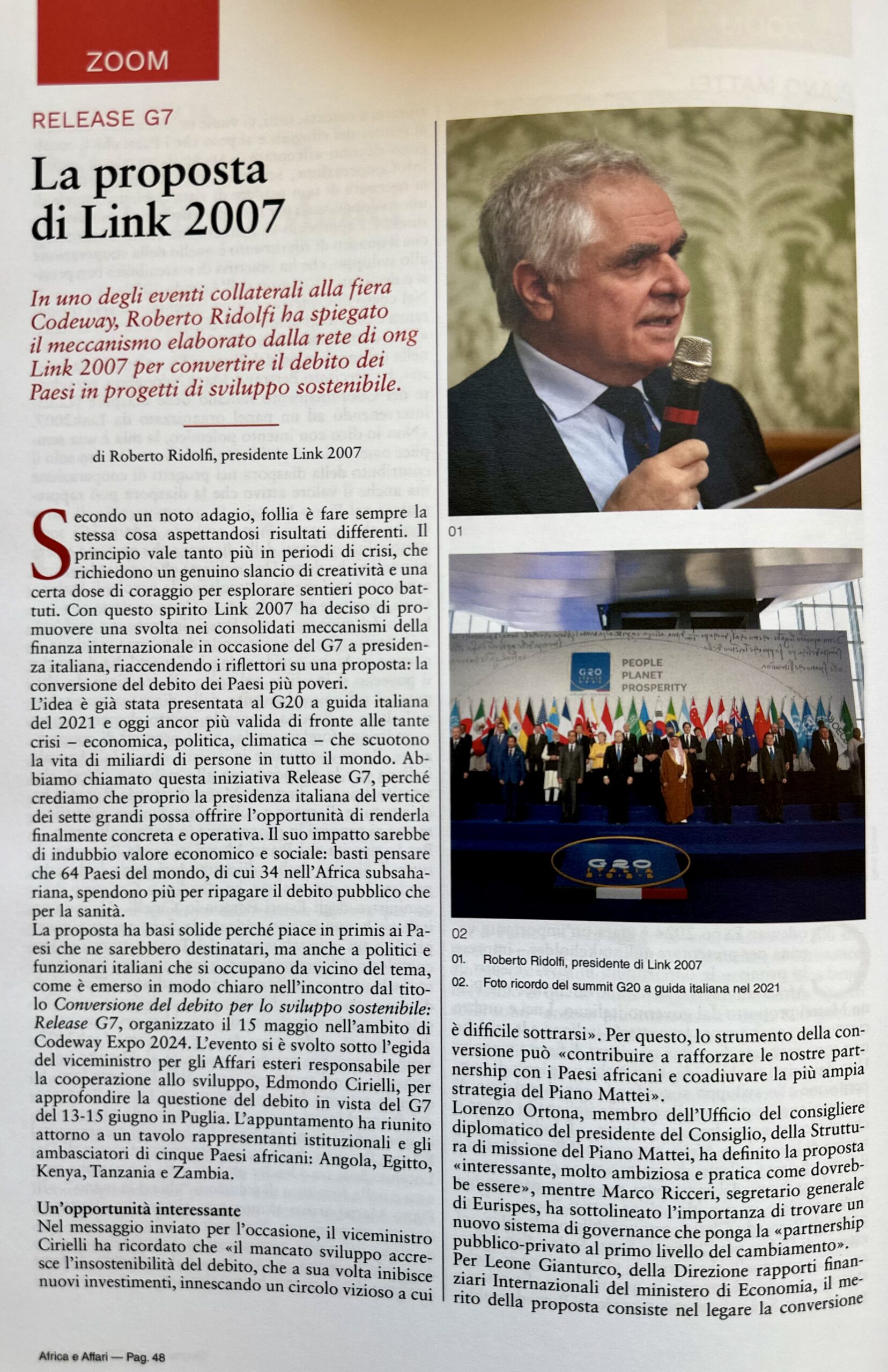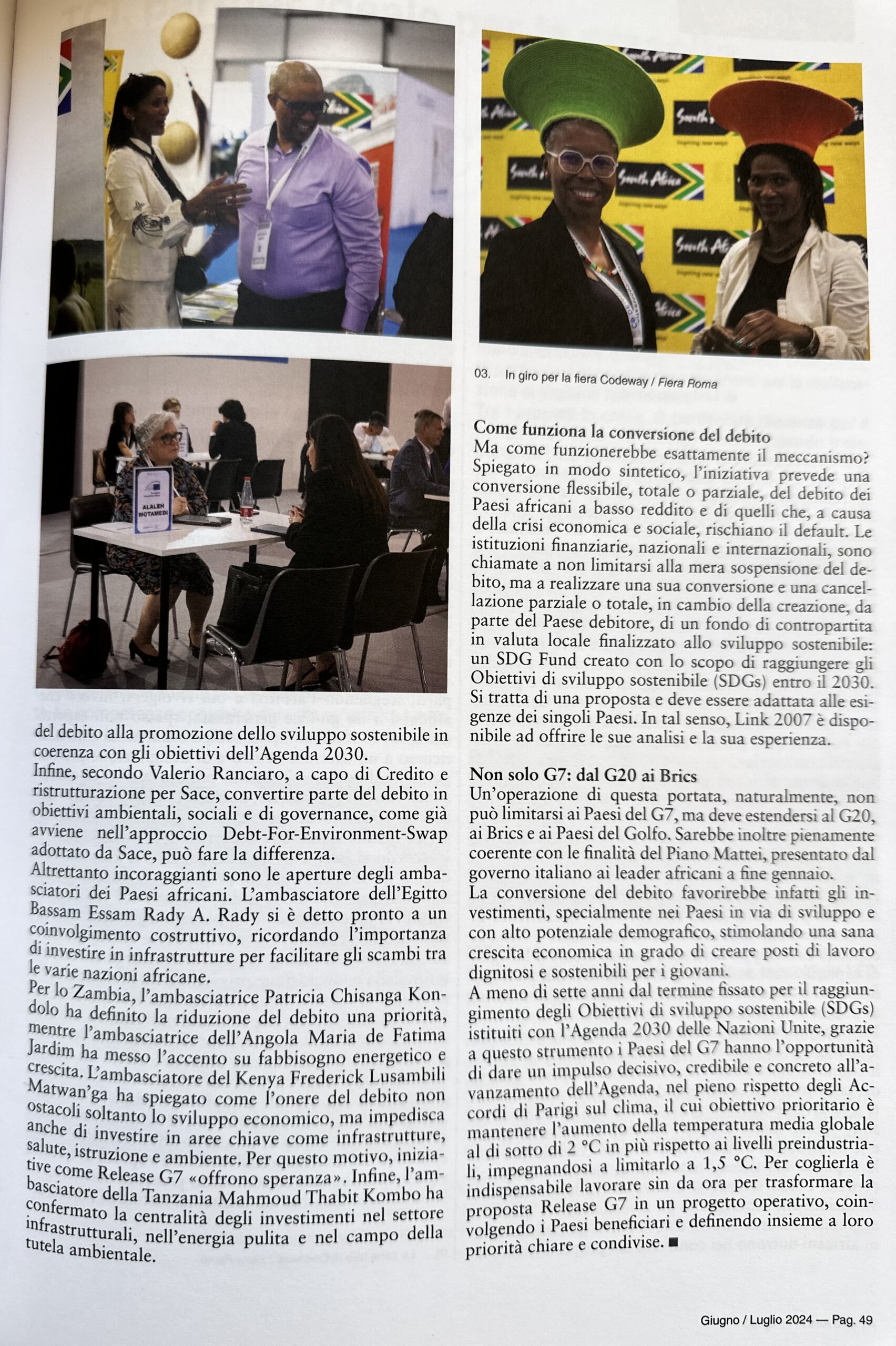Release G7 : How to turn poor countries’ debt into a tool for development. The LINK 2007 proposal

12.07.2024
A sound and viable solution to break out of the spiral of mounting debt and build new opportunities for sustainable growth
According to a well-known adage, folly is doing the same thing over and over again while expecting different results. The principle applies all the more in times of crisis, which require a genuine burst of creativity and a certain amount of courage to explore little-trodden paths. In this spirit, LINK 2007 decided to promote a change in the consolidated mechanisms of international finance on the occasion of the G7 Italian presidency, turning the spotlight back on a proposal: debt conversion for the poorest countries. An idea already presented at the Italian-led G20 in 2021 and even more valid today in the face of the many crises – economic, political, climate – that shake the lives of billions of people around the world. We have called this initiative ‘Release G7’ because we believe that it is precisely the Italian presidency of the summit of the big seven that could offer the opportunity to finally make it concrete and operational. Its impact would be of undoubted economic and social value: suffice it to think that 64 countries in the world, 34 of which in sub-Saharan Africa, spend more on paying off public debt than on health.
Mattei Plan and international cooperation: a step forward in the Italy-Africa dialogue
The proposal has solid foundations because it appeals first and foremost to the countries that would be its recipients, but also to Italian politicians and officials who are closely involved in the issue, as became clear at the meeting ‘Debt Conversion for Sustainable Development: G7 Release’, organised by our network in Rome on 15 May. The event was held under the aegis of the Deputy Minister for Foreign Affairs responsible for development cooperation, Hon. Edmondo Cirielli, as part of Codeway Expo 2024, to discuss the issue of debt in the run-up to the G7 meeting on 13-15 June in Puglia. An appointment that brought together institutional representatives and the Ambassadors of five African countries: Angola, Egypt, Kenya, Tanzania and Zambia.
An opportunity also for Italy
In the message sent for the occasion, Deputy Minister Hon. Cirielli recalled that ‘lack of development increases the unsustainability of debt, which in turn inhibits new investments, triggering a vicious circle from which it is difficult to escape’. For this reason, the conversion tool can ‘help strengthen our partnerships with African countries and assist the broader Mattei Plan strategy’. Lorenzo Ortona, member of the Office of the Diplomatic Advisor to the President of the Council, of the Mission Structure of the Mattei Plan, described the proposal as ‘interesting, very ambitious and practical as it should be’, while Marco Ricceri, Secretary General of Eurispes, stressed the importance of finding a new governance system that puts the ‘public-private partnership at the forefront of change’. For Leone Gianturco, from the MEF’s International Financial Relations Directorate, the merit of the proposal lies in linking debt conversion to the promotion of sustainable development in line with the 2030 Agenda goals. Finally, according to Valerio Ranciaro, Chief Credit & Restructuring SACE, converting part of the debt into environmental, social and governance objectives, as is already the case in the Debt-For-Environment-Swap approach adopted by SACE, can make a difference.
The openness of African countries
Equally encouraging are the openings of the Ambassadors of African countries. Egypt’s Ambassador Bassam Essam Rady A. Rady said he was ready for constructive engagement, recalling the importance of investing in infrastructure to facilitate trade between African nations. For Zambia, Ambassador Patricia Chisanga Kondolo called debt relief a priority, while Angola’s Ambassador Maria de Fatima Jardim emphasised energy needs and growth. Kenyan Ambassador Frederick Lusambili Matwan’ga explained how the debt burden not only hinders economic development, but also prevents investment in key areas such as infrastructure, health, education and the environment. This is why initiatives like ‘Release G7’ ‘offer hope’. Finally, Tanzanian Ambassador Mahmoud Thabit Kombo confirmed the centrality of infrastructure investments, clean energy and environmental protection.
How debt conversion works
But how exactly does the mechanism work? Explained concisely, the initiative envisages a flexible total or partial conversion of the debt of low-income African countries and those that, due to the economic and social crisis, risk default. The financial institutions, national and international, are called upon not to limit themselves to merely suspending the debt, but to carry out its conversion and partial or total cancellation, in exchange for the debtor country’s creation of a counterpart fund in local currency aimed at sustainable development: a real Sdg Fund, i.e. created with the objective of achieving the Sustainable Development Goals by 2030.
This is a proposal and must be adapted to the needs of individual countries. In this sense, LINK 2007 is available to offer its analysis and experience.
Not only G7: from the G20 to the BRICS
An operation of this magnitude, of course, cannot be limited to the G7 countries, but must extend to the G20, the BRICS and the Gulf countries. It would also be fully consistent with the aims of the Mattei Plan, presented by the Italian government to African leaders at the end of January. Debt conversion would in fact favour investments, especially in developing countries with high demographic potential, stimulating healthy economic growth capable of creating decent and sustainable jobs for young people. With less than seven years to go before the deadline set for achieving the Sustainable Development Goals, thanks to this instrument, the G7 countries have the opportunity to give a decisive, credible and concrete impetus to the advancement of the 2030 Agenda, in full compliance with the Paris Climate Accords. To seize it, it is essential to work right now to transform the ‘Release G7’ proposal into an operational project, involving the beneficiary countries and defining clear and shared priorities with them.
(Roberto Ridolfi, President LINK 2007)
The article was published in Africa and Business, June/July 2024 edition


